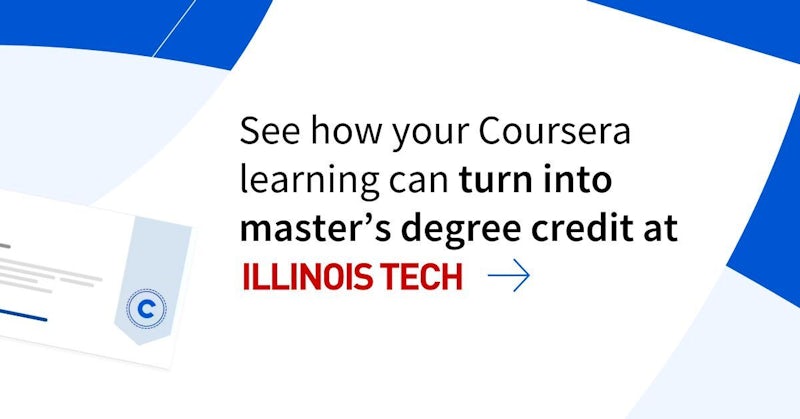Your Guide to Artificial Intelligence (AI) Degrees
When you're interested in working in AI, earning a bachelor's or master's degree in the field can be a great way to develop or advance your knowledge.
![[Featured image] A woman wearing glasses stands over a robotics work table staring at her laptop.](https://d3njjcbhbojbot.cloudfront.net/api/utilities/v1/imageproxy/https://images.ctfassets.net/wp1lcwdav1p1/2Z03waHicihEYbImIXoBOZ/98e001449932f71e260c634836dce80b/iStock-996179448.jpg?w=1500&h=680&q=60&fit=fill&f=faces&fm=jpg&fl=progressive&auto=format%2Ccompress&dpr=1&w=1000)
Artificial intelligence (AI) stands to add $19.9 trillion and 3.5 percent of the worldwide gross domestic product (GDP) by 2030, according to research from the International Data Corporation (IDC) [1]. To help achieve that economic potential, jobs in AI are poised to grow significantly in the coming years. They also tend to pay higher salaries: the average base salary for an AI engineer is $134,623 in the United States, according to Glassdoor [2].
Earning a bachelor’s degree or master’s degree in artificial intelligence can be a worthwhile way to learn more about the field, develop key skills to begin—or advance—your career, and graduate with a respected credential. While specific AI programs are still relatively limited compared to, say, computer science, there are a growing number of options to explore at both the undergraduate and graduate levels.
In this article, we’ll discuss bachelor’s and master’s degrees in artificial intelligence you can pursue when you want to hone your abilities in AI.
specialization
Deep Learning
Become a Machine Learning expert. Master the fundamentals of deep learning and break into AI. Recently updated with cutting-edge techniques!
4.9
(135,781 ratings)
912,115 already enrolled
Intermediate level
Average time: 3 month(s)
Learn at your own pace
Skills you'll build:
Algorithms, Artificial Neural Network, Transformers, Data Analysis, Recurrent Neural Network, Computer Programming, Mathematics, Human Learning, Convolutional Neural Network, Calculus, Machine Learning, Network Architecture, Organizational Development, Artificial Neural Networks, Deep Learning, Tensorflow, Network Model, Regression, Computer Vision, Mathematical Theory & Analysis, Applied Machine Learning, Machine Learning Algorithms, Linear Algebra, Python Programming, Neural Network Architecture, Backpropagation, Object Detection and Segmentation, Facial Recognition System, Mathematical Optimization, hyperparameter tuning, Multi-Task Learning, Decision-Making, Inductive Transfer, Natural Language Processing, Gated Recurrent Unit (GRU), Long Short Term Memory (LSTM), Attention Models
Bachelor’s-level AI degrees
Earning a bachelor’s degree in artificial intelligence means either majoring in the subject itself or something relevant, like computer science, data science, or machine learning, and taking several AI courses. It’s worth noting that AI bachelor’s degree programs are not as widely available in the US as other majors, so you may find you have more options if you explore related majors.
It takes four or five years to complete a bachelor’s degree in AI when you’re able to attend a program full-time, and your total cost of college will depend on several factors, including whether you attend a public or private institution. For example, annual tuition at a four-year public institution costs $11,610 on average (for an in-state student) and $43,350 for a four-year private institution in the US [3].
AI degree program: Artificial intelligence as a major
A small but growing number of universities in the US now offer a Bachelor of Science (BS) in artificial intelligence. However, you may sometimes find AI paired with machine learning as a combined major. AI majors tend to be housed in computer science departments. As such, your bachelor’s degree coursework will likely emphasize computer systems fundamentals, as well as mathematics, algorithms, and programming languages.
Examples of AI coursework:
Introduction to algorithms
Introduction to machine learning
Computer organization and systems
Design and analysis of algorithms
Principles and techniques of algorithms
AI and decision-making
AI degree program: Artificial intelligence as a minor
Instead of offering a full AI major, some universities offer students the chance to minor in AI, which can be a valuable way to earn a bachelor’s degree in a broader subject, like computer science, while developing a specific focus on artificial intelligence. As with your major, you can list your minor on your resume once you graduate to show employers the knowledge you gained in that area.
Deciding whether to major or minor in AI or another relevant subject depends on your larger educational interests and career goals. Learn more about how to pick the best college major for you.

professional certificate
IBM AI Developer
Kickstart your career in artificial intelligence. Build job-ready skills in AI technologies, generative AI models, and programming and learn to build AI-powered chatbots and apps in just 6 months
4.6
(9,742 ratings)
161,406 already enrolled
Beginner level
Average time: 6 month(s)
Learn at your own pace
Skills you'll build:
Chatbots, Voice Assistants, Python Programming, Software Architecture, Computer Programming, Programming Principles, Agile and Scrum, Software Engineering, Communication, Software Development Lifecycle (SDLC), Coding Challenge, Career, interview Preparation, Full Stack Developer, Software Engineer, Large Language Models (LLM), Generative AI, Natural Language Generation, Artificial Intelligence (AI), ChatGPT, Prompt Engineering, prompt patterns, Cascading Style Sheets (CSS), Web, Web Development, JavaScript, Software Testing, Web Application, Flask, Application development, Code generation, Software Development, AI prompts, Pandas, Data Analysis, Data Science, Numpy, Natural Language Processing, AI ethics, Machine Learning, Artificial Intelligence
AI degree program: Other majors for studying artificial intelligence
Given that AI is still a newer offering in terms of college majors, you may find more bachelor’s degree options by studying one of the subjects below, which often involve taking AI courses:
Computer science: Many universities offer a computer science major, which may allow you to take courses in AI as part of your major or specialize in AI as a computer science track.
Data science: Often, data science majors will include coursework on both AI and machine learning, which can be useful to gain a better understanding of the subjects and develop your skills accordingly.
Robotics: Whether you study robotics or robotics engineering, you’ll likely have to take courses in both AI and machine learning as part of your degree program.
Jobs you can pursue with a bachelor’s-level artificial intelligence degree
With a bachelor’s degree, you may qualify for certain entry-level jobs in the fields of AI, computer science, data science, and machine learning. The salaries listed below are for 0–1 years of experience, according to Glassdoor.
| Job title | Average total salary (US) |
|---|---|
| Data analyst | $90,437 [4] |
| Software engineer | $133,647 [5] |
| Junior machine learning engineer | $135,218 [6] |
| Junior AI engineer | $96,223 [7] |
Explore more jobs you can get when you graduate with a bachelor’s degree in:
Master’s-level AI degrees
Earning your master’s degree in artificial intelligence can be an excellent way to advance your knowledge or pivot to the field. Depending on what you want to study, master’s degrees take between one and three years to complete when you’re able to attend full-time. In the US, they typically cost between $44,640 and $71,140 [8].
Specializing in AI
At the graduate level, you may find more options to study AI compared to undergraduate options. There are many respected Master of Science (MS) graduate programs in artificial intelligence in the US. Similar to undergraduate degree programs, many of these degrees are housed in institutions’ computer science or engineering departments.
Beyond in-person programs, there are a number of online master’s degrees in artificial intelligence, as well as professional master’s degrees, which tend to take less time (around one year) and focus more on practical skills development.
At the graduate level, the focus of your program will likely move beyond the fundamentals of AI and discuss advanced subjects such as ethics, deep learning, machine learning, and more. You may also find programs that offer an opportunity to learn about AI in relation to certain industries, such as health care and business.
Examples of AI master’s coursework:
Machine learning for signal processing
Context modeling
Intelligent information systems
Introduction to pattern recognition

Jobs you can pursue with a master’s-level artificial intelligence degree
With a master’s degree in AI, you may find that you qualify for more advanced roles, like the ones below. Explore more AI jobs worth considering.
| Job title | Average total salary (US) |
|---|---|
| Data engineer | $133,939 [9] |
| Computer research scientist | $146,542 [10] |
| Data scientist | $165,286 [11] |
| AI engineer | $205,651 [12] |
Are degrees in AI worth it?
Earning a degree can lead to higher salaries, lower rates of unemployment, and greater competitiveness as an applicant. Even if a degree doesn’t feel necessary at this stage of your career, you may find that you need at least a bachelor’s degree as you set about advancing.
Learn more about whether a bachelor’s degree is worth it or whether a master’s degree is worth it for your specific goals.

Alternatives to earning your degree in AI
There may be times when a full degree is not the best option for your goals. In that case, the options below may be worth exploring to level up your AI knowledge:
MOOCs: Enrolling in massive open online courses (MOOCs) means you can learn in a more flexible and self-paced manner. MOOCs tend to be a great way to gain a foundational sense of the subject or dive into something more niched and advanced. On Coursera, check out DeepLearning.AI’s Generative AI for Everyone or IBM’s Introduction to AI.
course
Generative AI for Everyone
Instructed by AI pioneer Andrew Ng, Generative AI for Everyone offers his unique perspective on empowering you and your work with generative AI. Andrew will ...
4.8
(3,247 ratings)
527,145 already enrolled
Beginner level
Average time: 5 hour(s)
Learn at your own pace
Professional Certificates: With a Professional Certificate, you’ll take a series of MOOCs, usually over several months, to earn a verified credential you can feature on your resume and LinkedIn page. Professional certificates can be a great way to strengthen your skills in an area while learning more about it. Check out professional certificates in AI and related subjects on Coursera, such as the IBM Applied AI Professional Certificate or the Google Data Analytics Professional Certificate.

professional certificate
IBM AI Developer
Kickstart your career in artificial intelligence. Build job-ready skills in AI technologies, generative AI models, and programming and learn to build AI-powered chatbots and apps in just 6 months
4.6
(9,742 ratings)
161,406 already enrolled
Beginner level
Average time: 6 month(s)
Learn at your own pace
Skills you'll build:
Chatbots, Voice Assistants, Python Programming, Software Architecture, Computer Programming, Programming Principles, Agile and Scrum, Software Engineering, Communication, Software Development Lifecycle (SDLC), Coding Challenge, Career, interview Preparation, Full Stack Developer, Software Engineer, Large Language Models (LLM), Generative AI, Natural Language Generation, Artificial Intelligence (AI), ChatGPT, Prompt Engineering, prompt patterns, Cascading Style Sheets (CSS), Web, Web Development, JavaScript, Software Testing, Web Application, Flask, Application development, Code generation, Software Development, AI prompts, Pandas, Data Analysis, Data Science, Numpy, Natural Language Processing, AI ethics, Machine Learning, Artificial Intelligence
Earn your artificial intelligence degree on Coursera
Earn your bachelor’s or master’s degree in either computer science or data science through a respected university partner on Coursera. You’ll find a flexible, self-paced learning environment so you can balance your studies around your other responsibilities.
Article sources
IDC. “Artificial Intelligence Will Contribute $19.9 Trillion to the Global Economy through 2030 and Drive 3.5% of Global GDP in 2030, https://www.idc.com/getdoc.jsp?containerId=prUS52600524.” Accessed March 4, 2025. tps://www.pwc.com/gx/en/issues/data-and-analytics/publications/artificial-intelligence-study.html." Accessed March 4, 2025.
Glassdoor. "AI Engineer Salary, https://www.glassdoor.com/Salaries/ai-engineer-salary-SRCH_KO0,11.htm." Accessed March 4, 2025.
College Board. "Trends in College Pricing 2024, https://research.collegeboard.org/media/pdf/Trends-College-Pricing-2024-presentation.pdf." Accessed March 4, 2025.
Glassdoor. “How much does a Data Analyst make?, https://www.glassdoor.com/Salaries/united-states-data-analyst-salary-SRCH_IL.0,13_IN1_KO14,26.htm.” Accessed March 4, 2025.
Glassdoor. “How much does a Software Engineer make?, https://www.glassdoor.com/Salaries/united-states-software-engineer-salary-SRCH_IL.0,13_IN1_KO14,31.htm.” Accessed March 4, 2025.
Glassdoor. “How much does a Junior Machine Learning Engineer make?, https://www.glassdoor.com/Salaries/junior-machine-learning-engineer-salary-SRCH_KO0,32.htm.” Accessed March 4, 2025.
Glassdoor. “How much does a Junior AI Engineer make?, https://www.glassdoor.com/Salaries/junior-ai-engineer-salary-SRCH_KO0,18.htm.” Accessed March 4, 2025.
Education Data Initiative. "Average Cost of a Master's Degree, https://educationdata.org/average-cost-of-a-masters-degree." Accessed March 4, 2025.
Glassdoor. “How much does a Data Engineer make?, https://www.glassdoor.com/Salaries/united-states-data-engineer-salary-SRCH_IL.0,13_IN1_KO14,27.htm.” Accessed March 4, 2025.
Glassdoor. “How much does a Research Computer Scientist make?, https://www.glassdoor.com/Salaries/united-states-research-computer-scientist-salary-SRCH_IL.0,13_IN1_KO14,41.htm.” Accessed March 4, 2025.
Glassdoor. “How much does a Data Scientist make?, https://www.glassdoor.com/Salaries/united-states-data-scientist-salary-SRCH_IL.0,13_IN1_KO14,28.htm.” Accessed March 4, 2025.
Glassdoor. “How much does an AI Engineer make?, https://www.glassdoor.com/Salaries/ai-engineer-salary-SRCH_KO0,11.htm.” Accessed March 4, 2025.
Keep reading
- March 25, 2025
- 6 min read · January 25, 2024
- January 6, 2025
- March 4, 2025
- March 13, 2025
- November 29, 2023
Coursera Staff
Editorial Team
Coursera’s editorial team is comprised of highly experienced professional editors, writers, and fact...
This content has been made available for informational purposes only. Learners are advised to conduct additional research to ensure that courses and other credentials pursued meet their personal, professional, and financial goals.
Learning paths for 40+ in-demand careers
Advance in your career with recognized credentials across levels.

Advance your career with top-rated exam prep courses today.



